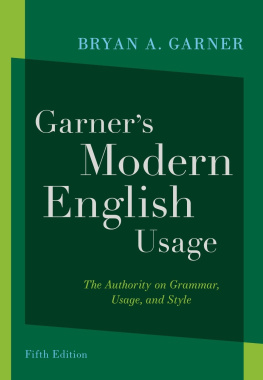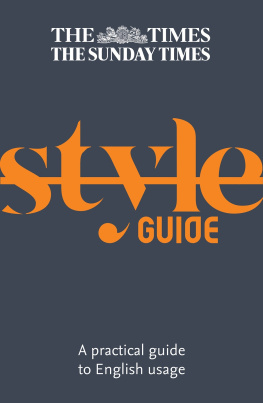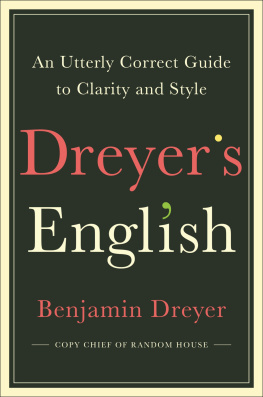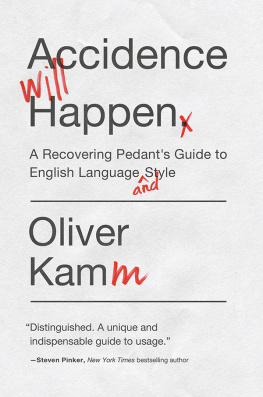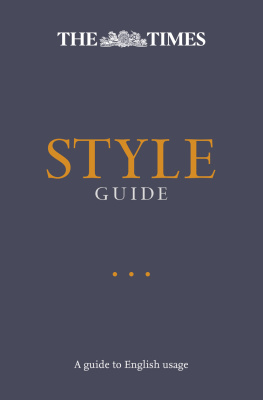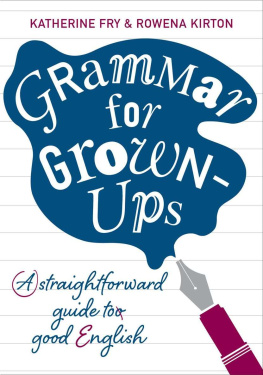Accidence
Will Happen
The Non-Pedantic Guide to
English Usage
Oliver Kamm

Contents
Many people are passionate about language. Im one of them. For some years Ive written a weekly column for The Times about questions of English usage. The column is prescriptive. It gives the best advice I can devise on what constructions are possible in Standard English, and how to write stylishly and grammatically.
Opinions on usage have to be based on something if theyre to be anything more than prejudices. My columns and this book invoke the evidence of how English is used. Thats the only standard we can employ for what the English language (or rather, the various dialects that make up English) consists of. Im interested in how English is spoken and written. Im much more interested in those mechanics than I am in complaining about how native English speakers use their own language.
Perhaps you grimace at the phrase between you and I (instead of between you and me ), or bored of (instead of bored with or bored by ), or different to (instead of different from ), or very unique (instead of just unique ), or less than ten items (instead of fewer than ten items ). I get many letters on these and other alleged errors of English usage, seeking my support in banishing them from public life. Yet constructions like these are used by native English speakers every day. All of them are common and none are (note that I say none are , even though some people will tell you that you must say none is ) ungrammatical.
Looking at the way language is used gives you some perspective on a subject that recurs in, and even dominates, public debate about English. Pedants are loud, numerous and indignant. They are convinced that standards in English usage are falling, and they blame schools and the media for tolerating this alleged deterioration. The outcome, so these purists maintain, is linguistic barbarism, in which slang, sloppiness and text-speak supplant English grammar.
Dont believe it. If there is one language that isnt endangered, its English. The language is changing because thats what a living language does. Linguistic change is not decline. Change is always bounded by the need to be understood. People can make mistakes in English but the grammar of the language never breaks down.
The abbreviations and symbols that make up text-speak follow grammatical rules. Text-speak wouldnt be usable otherwise. Perhaps it blurs the gap between spoken and written English but thats no bad thing.
If you worry that English is changing so radically that our cultural heritage of language and literature will be lost to our descendants, your concerns are well intentioned but groundless. The prophets of decline have been around for a long time. They appear in every generation and they are always mistaken. This book explains how and why theyre wrong. More broadly, it offers guidance and reassurance on the range of possibilities in English usage.
From fearing for the future of English its a short step to worrying about the way we ourselves use language. Its natural and proper to do this. The task of being expressive is worth thinking about and taking time over. Many articulate people, fluent in the spoken and written word, take this apprehension a stage further, however. How many times have you met people who diffidently, even apologetically, explain that they were never taught grammar? It happens to me often.
Opposite me at The Times sits one of Britains leading political commentators. Prime ministers seek his advice. Television interviewers vie for his opinions. He is a brilliant conversationalist, columnist, debater and public speaker. Yet scarcely a day passes when he doesnt look up from his desk to ask me if a particular construction in English is grammatical, or to check his spelling and punctuation. Is it possible to say the best candidate if there are only two of them, or must it be the better candidate ? Should the word data be singular or plural? Is it illogical to say a friend of mine , when a friend of me should be sufficient?
Almost invariably, I tell him to go with his instinct. Yet I cant shift him from his conviction that he doesnt know the structure of his own language.
My friend is wrong about the state of his linguistic knowledge. In that respect, he is like many Times readers who write to me on questions of usage. They are intelligent and use language well, yet are convinced that their English is sub-standard. Their eloquence proves that theyre mistaken.
Perhaps the generation educated since the 1960s is particularly prone to such worries because, for them, instruction in English grammar became quite rare. My impression is that many older people too doubt their abilities in English.
The purpose of this book is to offer advice on usage, and I hope it does so entertainingly and reliably, but its also to argue that the prospects for the English language are bright. Standards of English are not declining; your standards of English are likely to be high. If youre among these worriers, I recommend you stop now and embrace the language that you already speak and write, in all its sophistication and complexity.
The title of this book encapsulates my reasoning. Its taken from the English edition of Asterix the Gaul . The indomitable Gaul has just bashed some Roman legionaries. One of the Romans says, dazedly: Vae victo, vae victis. Another observes: We decline. The caption above this scene of destruction reads: Accidence will happen.
You have to believe me that this is funny. The first legionarys Latin phrase means: Woe to the one who has been vanquished, woe to those who have been vanquished. The scene is a riff on grammar. It was made up by Anthea Bell, the English translator of the Asterix books. She is my mother and I have stolen her joke. Ill render it leaden by explaining why it appeals to me. Victo is the dative singular and victis is the dative plural. The legionary is literally declining, in the grammatical sense. The aspect of grammar that deals with declension and conjugation is called accidence.
One of the most remarkable characteristics of English usage is this: if you are a native speaker, you already know its grammar. The same is true of the vast numbers of non-native English speakers whose command of the language is indistinguishable from that of articulate native speakers.
The grammar that you use may not be that of Standard English though the fact that youre reading this book, which is written in Standard English, suggests that it probably is. It will be one variant of English among others. You have already acquired a mastery of complex grammatical constructions. We have all done this, through an instinct by which we can learn a set of rules. Those rules, once learnt at a very young age, stay with us. We know, for example, that a plural noun in Standard English is usually formed by adding -s or - es to a noun stem. We also know the exceptions ( aircraft , children , feet , oxen , sheep , teeth and so on) to this rule and dont have to learn them afresh.
Thats a very simple rule. There are many rules that are less obvious but that we also unfailingly follow. How about the fact that we know John admires himself is fine but that John thinks Mary admires himself isnt? We know that John likes him is about two people whereas John thinks hes clever may be about only one. We know that read is pronounced like reed in give me a book to read but like red in Ive now read the book . We know that house ends with an s sound in they made the council house immaculate but with a z sound in they made the council house the family .
Im not suggesting you grant yourself credit for an achievement that is common to everyone. Learning rules of language is part of what it is to be human. By some instinct, we have the ability to learn and apply those rules. (Not everyone has the same set of rules, of course. The instinct is universal but languages differ. Which language, or languages, you speak as a native depends on the environment in which you grew up. A German toddler doesnt have a biological instinct to learn German grammar, nor does a Japanese toddler have an instinct to learn Japanese grammar. But all toddlers have an instinct to learn some set of rules.)
Next page

